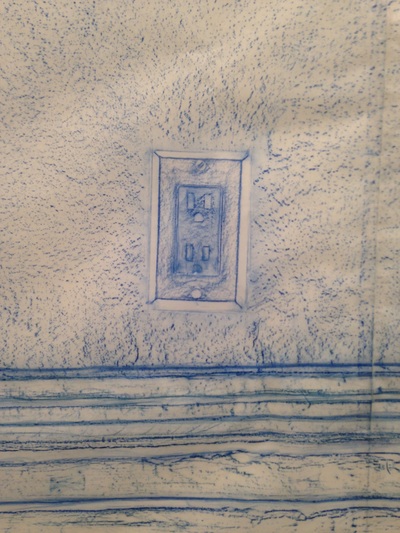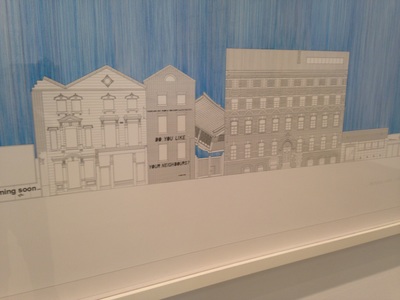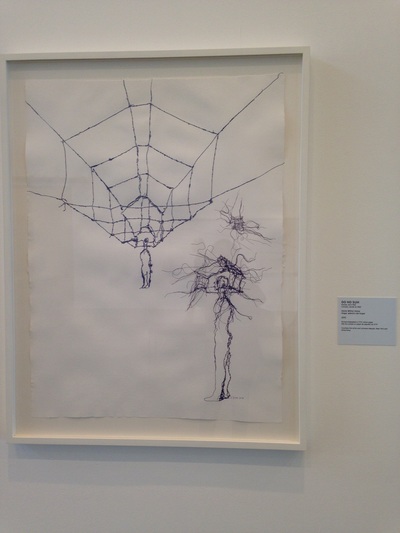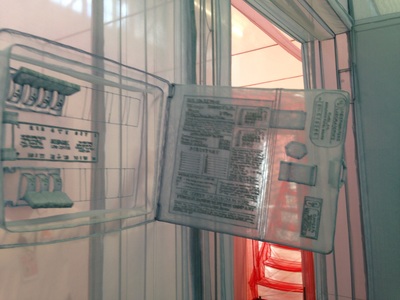|
In this period of increasing attention to walls, national boundaries, and trade protections, even as we experience climate-change-without-borders, are wirelessly entangled within an internet-(mostly)-without-borders, and watch global-access-flyers – grumbling far above slow-travel-migrants – move faster through every line in an airport, Gabriela Montero’s Ex Patria and Do Ho Suh’s obsessive recursions of “Home” extemporize on old-fashioned nostalgia, while Harrison’s “[Nest]” traces the delicate immediacy of a home qua home. Montero lives in exile in the United States and Do Ho Suh creates art – drawings, netted forms, and simulacra – all over the world while scattering residence across Seoul, New York, and London. Harrison was born in Germany, grew up mostly in New Hampshire, and lives in Maryland. Montero, a political exile, wrote, and plays, Ex Patria in the tradition of the Russian composers of the first decades of the twentieth century, fiercely longing for a beauty that was a promise of youth. The piece, dedicated to the people of her native Venezuela and a memorial for the 19336 people who were murdered in that country in 2011, conjures the memory of an “old country” that is wounded, potentially mortally. Over the four years or so since Ex Patria was first played, Montero’s implacable rejection of the current Venezuelan regime, including its extraordinary musical program, Sistema, for over 500,000 youth, has amplified the piece’s political narrative. Starkly, Montero’s critique of Sistema as a fig-leaf for a criminally dysfunctional government calls for letting the bubble of music pop, so to speak, to say “NO,” to wipe the body politic clean, and start anew. Ex Patria expresses the tragedy of the bubble, Sistema’s success and beauty growing in a fundamentally toxic and violent society, and its inevitable corruption.* Suh is not an exile like Montero. His existential mobility is unmotivated, like the life-cycle mobility of a firefly. He explains, “Once my fortune teller told me that I have five horses and that means that I travel a lot….” Embodying a form of mobility that is shaped by the technologies that are laid into our time, his nostalgia is for the form of home: the skeletal underframes, the permeable walls, the obtrusive shapes of haunting exits and entrances, including doors, windows, electrical outlets, and air conditioners. He is, perhaps, best known for his gossamer recreations of his apartment homes, but the most nostalgic piece, the most riveting for me, in the exhibition that is currently on at the San Diego Museum of Contemporary Art, is the piece that combines a miniature version of his traditional home in South Korea (placed on a truck) with a film that traces (or affects to trace?) the journey of the home to Madison Square Park in New York City. Suh seeks to carry “home” like a snail, a virtual snail with a virtual home, mind games, in which all of “home” resides in him, or he is always home. The exhibition in San Diego is presented across four spaces. Along with my local artist friend, Patti Fox, I walked through the two gallery spaces of the Museum, which are next to San Diego’s main train station and the downtown trolley hub, respectively, and separated by a wide road. We started at two o’clock in the afternoon, so the sun was very high and bounded the interior spaces so intensely that I couldn’t avoid attention to the very specific concatenations of radiant light, shadow, translucence, darkness, and projected light as we walked through one exhibition space to another. Suh, to my delight, is obsessively specific. His drawings have fine, straight lines, repeated one after the other until the image is complete. He sticks thread on paper to create figures and stories in which each loose end is perfect. His rubbings of every apartment wall, outlet, plaster pimple, and stovetop draw the viewer into mimicked attention to the banal phenomena of “home.” And his fabric simulacrum of his New York city apartment has astonishingly detailed embroidery and seams.** If Leslie Harrison’s “[Nest]” has nostalgia, it is very brief. The poem captures the fragile uncertainty of time, space, and fluttering materials that a nest represents. At some point, the elegiac home country of Montero’s Ex Patria and the obsessive scurrying of Suh’s “Home” recreations had their origins in wavering, delicate, and fundamentally physical moments like “this lodge that takes the shape of a wasp’s nest paper and swaying.” While Ex Patria bellows the loves and deaths of the multitudes that contain home, and Suh weaves them into nets that look repetitive and forever and then you notice that the figures vary and the nets cross continents, [Nest] whispers “the people on shore wave small scraps of fabric they’re white in the dusk.” Reading Harrison’s poem, with “heart” close to its geometric and literary center (“the heart goes dark the heart becomes just one more vessel waiting”), alongside Montero’s brief concerto and Suh’s art, I glimpse and want to capture how the three together represent the immediacy, mobility, and nostalgia of “home” in the 21st century, but I’m defeated by the over-determined neatness of my synthesis. And so I will stop here. *A contrary view of Sistema, held for example by Gustavo Dudamel, sees it as a hopeful program, preparing youth to be better citizens, morally and otherwise, who eventually will build a more beautiful tomorrow. **In my home city, San Diego, Suh has created a “Fallen Star,” a tilted house perched on the edge of a tall building for engineers. It has a lovely garden in front and pretty furnishings inside, and provokes an impossible imbalance when you enter it. When you leave it though: from the outside, from far away, it becomes a metaphor, an empty signifier, a wish.
0 Comments
So I think it’s time to write why I do not support Sanders.
Over the last few months Sanders’ supporters have felt comfortable, indeed impelled, to tell me and the world why they oppose/dislike/hate Clinton. I have not said much about why I don’t support him, in part because I like him and the causes he has supported throughout his career. As a journalist pointed out he (and Trump, like it or not) have effectively expanded the “Overton window” or spectrum of public issues/positions that are legitimate and mainstream to discuss and push. The other reason I have not focused much on why I don’t support Sanders (apart from his fragile electability) is because I’ve found it more interesting to write about why I support Clinton, including how I engage my concerns. But after the appalling increase in negative campaigning by Sanders, I think I should say why I don’t support him. -- I don’t trust demagoguery, especially because of what it tends to produce in the movements it spawns. It tends to produce a self-righteous narrowness among followers, potentially spawning movements that risk becoming reactive and radically repressive of dissent in their own ways. Sanders’ campaign and supporters have tended to project those who don’t join them as the unenlightened, the bad, and/or the handmaidens and footmen of status quo privilege. The attacks on Elizabeth Warren for not endorsing Sanders provide an example. Recently, the increasingly shrill self-righteousness of Sanders’ campaign and supporters (not all, but many of those who make themselves most heard; and if you feel that Sanders and you are mischaracterized by this description, you are feeling, a little, the way Clinton and many of her supporters feel) has reminded me of Yuri Zhivago’s “Revolutions are made by fanatical men of action with one-track minds, men who are narrow-minded to the point of genius. They overturn the old order… but for decades thereafter, … the spirit of narrowness which led to the upheaval is worshipped as holy.” (from Pasternak’s Doctor Zhivago) Ok, that is a bit strong and it calls for a much more complex discussion of revolutionary change (and the structures of oppression that revolution at its best seeks to transform), but you get the idea! -- I don’t think he can do what he says he wants to and I would be uncomfortable supporting someone just because he says what I want. From my reading of his record, his speeches, and his interviews, he has neither the knowledge, nor the sociopolitical networks and legislative support, nor a strategy for building the sociopolitical networks and legislative support to make his most visionary statements move forward (leave alone be achieved) in four years. -- I think his electability is more fragile than Clinton’s. Against Trump, he possibly/probably would win. I think the Republicans are going to replace Trump in some way or the other, and with any other Republican (including Cruz) I think the red-baiting and other more general attacks on Sanders (which we have not seen any of yet, and not because the substance and planning aren’t out there) will make it very possible, even likely, that he will lose. And we have potentially three Supreme Court nominations under the next President. -- I think he is impassioned for the right things and good-hearted. I also think he’s fuzzy in his thinking and I don’t like or trust his advisers. |
AuthorMeenakshi Chakraverti Archives
December 2023
Categories
All
|





 RSS Feed
RSS Feed